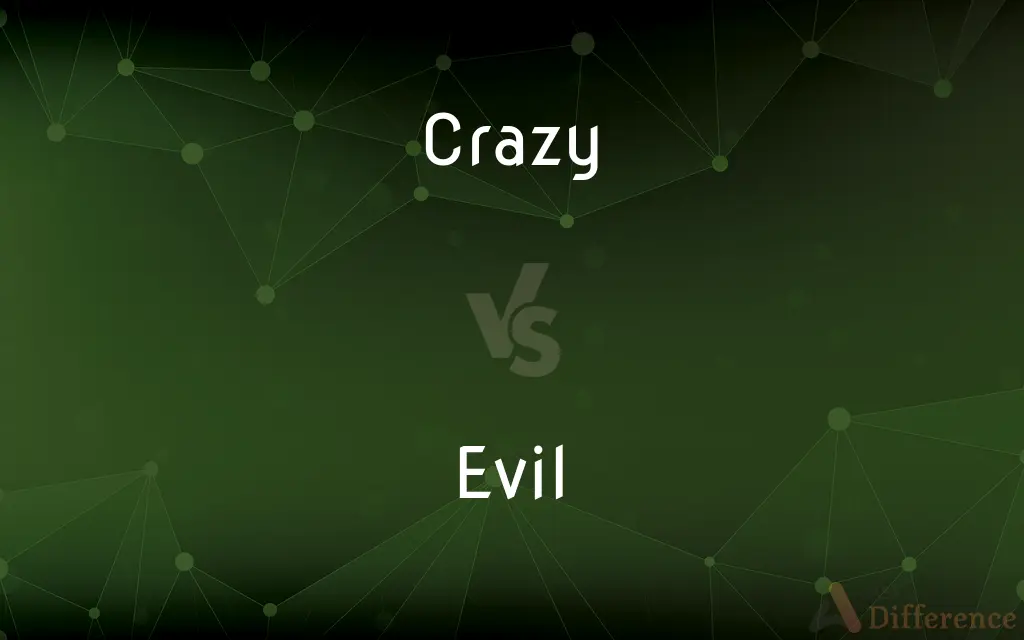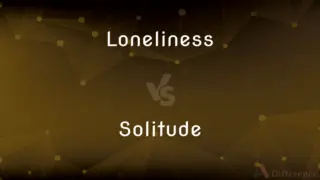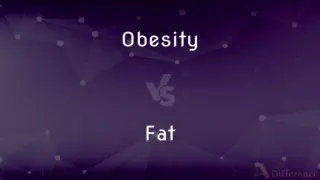Crazy vs. Evil — What's the Difference?
Edited by Tayyaba Rehman — By Fiza Rafique — Updated on May 7, 2024
Crazy typically refers to behavior or thinking that is irrational or unpredictable, while evil denotes actions or intentions that are morally reprehensible or malevolent.

Difference Between Crazy and Evil
Table of Contents
ADVERTISEMENT
Key Differences
Crazy often implies a lack of rationality or an inability to predict behavior, usually due to mental instability or emotional distress. On the other hand, evil is associated with deliberate wrongdoing and moral corruption, often involving harm to others or the violation of ethical standards.
While crazy can stem from various psychological conditions, making it a subject in medical and psychological contexts, evil is more about ethical judgment and is frequently discussed in philosophical, religious, and cultural discussions.
Crazy does not necessarily carry a moral dimension; it is more about a state of mind that deviates from the norm due to confusion, panic, or mental disorders. Whereas, evil is inherently tied to morality, often described as the presence of malice and the intentional infliction of harm.
In society, individuals described as crazy might elicit sympathy or a call for medical intervention, reflecting a compassionate approach to mental health issues. Conversely, those labeled as evil might face condemnation or punitive actions, reflecting societal censure for harmful behaviors.
People often use "crazy" colloquially to describe actions that are unexpected or hard to understand, without serious implications. In contrast, describing someone or something as evil suggests a strong moral judgment, usually with a negative connotation and an implication of severe harm or malevolence.
ADVERTISEMENT
Comparison Chart
Definition
Pertaining to a state of mental instability.
Associated with immorality and malevolent actions.
Connotation
Generally neutral, can be medical or colloquial.
Strongly negative, with moral undertones.
Social Perception
Often viewed as a condition needing compassion.
Seen as a choice deserving condemnation or fear.
Implication
Does not imply intent or moral judgment.
Involves intent and is inherently moral.
Usage in Speech
Used to describe behavior or mental states.
Used to judge actions or character.
Compare with Definitions
Crazy
Not making sense; illogical.
Her plan sounds absolutely crazy.
Evil
Producing sorrow, distress, or calamity.
The hurricane was an evil disaster for the region.
Crazy
Characterized by disordered mental faculties.
She was diagnosed as clinically crazy.
Evil
Profoundly immoral and malevolent.
His evil deeds could not be justified by any argument.
Crazy
Mentally deranged, especially as manifested in a wild or aggressive way.
He had a crazy look in his eyes that frightened everyone.
Evil
Ominous or portending harm.
There was an evil glint in his eye that warned of his intentions.
Crazy
Extremely enthusiastic.
I'm crazy about the new restaurant.
Evil
Harmful or tending to harm.
The policy had an evil impact on the environment.
Crazy
Impractical or unlikely.
He came up with some crazy scheme that can't possibly work.
Evil
Characterized by or indicative of moral depravity.
The dictator's rule was marked by evil corruption.
Crazy
Mad, especially as manifested in wild or aggressive behaviour
Stella went crazy and assaulted a visitor
A crazy look
Evil
Evil, in a general sense, is defined by what it is not—the opposite or absence of good. It can be an extremely broad concept, although in everyday usage it is often more narrowly used to talk about profound wickedness.
Crazy
Extremely enthusiastic
I'm crazy about Cindy
A football-crazy bunch of boys
Evil
Morally bad or wrong; wicked
An evil tyrant.
Crazy
(of an angle) appearing absurdly out of place or unlikely
The monument leant at a crazy angle
Evil
Causing ruin, injury, or pain; harmful
The evil effects of a poor diet.
Crazy
Extremely
I've been crazy busy
Evil
Characterized by or indicating future misfortune; ominous
Evil omens.
Crazy
A mad person
Keep that crazy away from me
Evil
Bad or blameworthy by report; infamous
An evil reputation.
Crazy
Mentally deranged.
Evil
Characterized by anger or spite; malicious
An evil temper.
Crazy
(Informal) Odd or eccentric in behavior.
Evil
The quality of being morally bad or wrong; wickedness.
Crazy
Possessed by enthusiasm or excitement
The crowd at the game went crazy.
Evil
That which causes harm, misfortune, or destruction
A leader's power to do both good and evil.
Crazy
Immoderately fond; infatuated
Was crazy about boys.
Evil
An evil force, power, or personification.
Crazy
Intensely involved or preoccupied
Is crazy about cars and racing.
Evil
Something that is a cause or source of suffering, injury, or destruction
The social evils of poverty and injustice.
Crazy
Foolish or impractical; senseless
A crazy scheme for making quick money.
Evil
In an evil manner.
Crazy
Intensely annoyed or irritated
It makes me crazy when you don't tell me you're going to be late.
Evil
Morally corrupt.
If something is evil, it is never mandatory.
Do you think that companies that engage in animal testing are evil?
Crazy
Disorderly or askew
One of the old window shutters hung at a crazy angle.
Evil
Unpleasant, foul (of odour, taste, mood, weather, etc.).
Crazy
(Informal) Extremely; very
That restaurant's always crazy busy on weekends, but it's worth the wait.
Evil
Producing or threatening sorrow, distress, injury, or calamity; unpropitious; calamitous.
Crazy
One who is or appears to be mentally deranged
"To them she is not a brusque crazy, but 'appropriately passionate'" (Mary McGrory).
Evil
(obsolete) Having harmful qualities; not good; worthless or deleterious.
An evil beast; an evil plant; an evil crop
Crazy
Of unsound mind; insane; demented.
His ideas were both frightening and crazy.
Evil
Undesirable; harmful; bad practice.
Global variables are evil; storing processing context in object member variables allows those objects to be reused in a much more flexible way.
Crazy
Out of control.
When she gets on the motorcycle she goes crazy.
Evil
Moral badness; wickedness; malevolence; the forces or behaviors that are the opposite or enemy of good.
The evils of society include murder and theft.
Evil lacks spirituality, hence its need for mind control.
Crazy
Very excited or enthusiastic.
He went crazy when he won.
Evil
Something which impairs the happiness of a being or deprives a being of any good; something which causes suffering of any kind to sentient beings; harm; injury; mischief.
Crazy
In love; experiencing romantic feelings.
Why is she so crazy about him?
Evil
(obsolete) A malady or disease; especially in combination, as in king's evil, colt evil.
Crazy
(informal) Very unexpected; wildly surprising.
The game had a crazy ending.
Evil
(obsolete) wickedly, evilly, iniquitously
Crazy
(obsolete) Flawed or damaged; unsound, liable to break apart; ramshackle.
Evil
(obsolete) injuriously, harmfully; in a damaging way.
Crazy
(obsolete) Sickly, frail; diseased.
Evil
(obsolete) badly, poorly; in an insufficient way.
It went evil with him.
Crazy
(slang) Very, extremely.
That trick was crazy good.
Evil
Having qualities tending to injury and mischief; having a nature or properties which tend to badness; mischievous; not good; worthless or deleterious; poor; as, an evil beast; and evil plant; an evil crop.
A good tree can not bring forth evil fruit.
Crazy
An insane or eccentric person; a crackpot.
Evil
Having or exhibiting bad moral qualities; morally corrupt; wicked; wrong; vicious; as, evil conduct, thoughts, heart, words, and the like.
Ah, what a sign it is of evil life,When death's approach is seen so terrible.
Crazy
Eccentric behaviour; lunacy; craziness.
Evil
Producing or threatening sorrow, distress, injury, or calamity; unpropitious; calamitous; as, evil tidings; evil arrows; evil days.
Because he hath brought up an evil name upon a virgin of Israel.
The owl shrieked at thy birth - an evil sign.
Evil news rides post, while good news baits.
It almost led him to believe in the evil eye.
Crazy
Characterized by weakness or feebleness; decrepit; broken; falling to decay; shaky; unsafe.
Piles of mean andcrazy houses.
One of great riches, but a crazy constitution.
They . . . got a crazy boat to carry them to the island.
Evil
Anything which impairs the happiness of a being or deprives a being of any good; anything which causes suffering of any kind to sentient beings; injury; mischief; harm; - opposed to good.
Evils which our own misdeeds have wrought.
The evil that men do lives after them.
Crazy
Broken, weakened, or dissordered in intellect; shattered; demented; deranged.
Over moist and crazy brains.
Evil
Moral badness, or the deviation of a moral being from the principles of virtue imposed by conscience, or by the will of the Supreme Being, or by the principles of a lawful human authority; disposition to do wrong; moral offence; wickedness; depravity.
The heart of the sons of men is full of evil.
Crazy
Inordinately desirous; foolishly eager.
The girls were crazy to be introduced to him.
Evil
Malady or disease; especially in the phrase king's evil, the scrofula.
He [Edward the Confessor] was the first that touched for the evil.
Crazy
Someone deranged and possibly dangerous
Evil
In an evil manner; not well; ill; badly; unhappily; injuriously; unkindly.
It went evil with his house.
The Egyptians evil entreated us, and affected us.
Crazy
Affected with madness or insanity;
A man who had gone mad
Evil
Morally objectionable behavior
Crazy
Foolish; totally unsound;
An impractical solution
A crazy scheme
Half-baked ideas
A screwball proposal without a prayer of working
Evil
That which causes harm or destruction or misfortune;
The evil that men do lives after them; the good is oft interred with their bones
Crazy
Marked by foolish or unreasoning fondness;
She was crazy about him
Gaga over the rock group's new album
He was infatuated with her
Evil
The quality of being morally wrong in principle or practice;
Attempts to explain the origin of evil in the world
Crazy
Possessed by inordinate excitement;
The crowd went crazy
Was crazy to try his new bicycle
Evil
Morally bad or wrong;
Evil purposes
An evil influence
Evil deeds
Crazy
Bizarre or fantastic;
Had a crazy dream
Wore a crazy hat
Evil
Having the nature of vice
Crazy
Intensely enthusiastic about or preoccupied with;
Crazy about cars and racing
Evil
Tending to cause great harm
Evil
Having or exerting a malignant influence;
Malevolent stars
A malefic force
Common Curiosities
What psychological disorders might be described as making someone appear crazy?
Disorders such as schizophrenia, bipolar disorder, or severe anxiety might lead someone to exhibit behaviors typically described as crazy.
Can actions be considered crazy without being evil, or vice versa?
Yes, actions can be considered crazy without being evil if they lack malice or harmful intent, and actions can be evil without being crazy if they are calculated and intentional.
What role does intent play in defining crazy versus evil?
Intent is crucial in defining evil, as it involves deliberate malice or harm, whereas crazy often lacks a coherent intent due to mental instability.
How do cultural narratives influence the perception of someone as crazy or evil?
Cultural narratives can greatly influence perceptions, where behaviors seen as deviant may be labeled as crazy in some cultures, while others might interpret similar actions as evil based on moral beliefs.
Are there historical figures commonly described as evil?
Yes, figures like Adolf Hitler, Joseph Stalin, and Pol Pot are often described as evil due to their actions and the massive harm they caused.
How do religious beliefs affect the interpretations of crazy and evil?
Religious beliefs can define both concepts strictly; evil is often seen as sin or moral failing, while mental illness (crazy) might be interpreted variously as a test of faith, possession, or a medical issue.
Can societal norms shift perceptions of what is considered crazy or evil?
Yes, societal norms greatly influence these perceptions, as behaviors accepted in one era or culture might be considered crazy or evil in another.
What literary works explore the themes of crazy and evil?
Works like "Macbeth" explore both themes, with Lady Macbeth's descent into madness (crazy) and Macbeth's moral fall (evil).
How do legal systems differentiate between crazy and evil?
Legal systems may treat individuals deemed "crazy" with considerations for their mental capacity and potential for rehabilitation, whereas "evil" actions, especially when intentional, may lead to stricter punishments.
Is it possible to cure or rehabilitate someone from being evil or crazy?
Rehabilitation approaches differ; mental health issues (crazy) can often be treated with therapy and medication, whereas changing deeply ingrained evil behaviors typically involves more complex ethical and psychological interventions.
Is evil attributed to external influences or personal choices more often than crazy?
Evil is more often attributed to personal choices and moral failings, whereas crazy is more frequently considered a result of external influences like genetics or environment.
How do children understand the concepts of crazy and evil?
Children may understand crazy as strange or unpredictable behavior and evil as actions that are intentionally hurtful or bad, learning more nuanced definitions as they grow.
How do the consequences of being labeled crazy versus evil differ in society?
Being labeled crazy might lead to medical treatment and social stigma, while being labeled evil can result in social ostracism and legal consequences.
What are the ethical implications of labeling someone as crazy or evil?
Labeling someone can affect their treatment by society and their access to rights and support; it raises ethical issues about stigma, justice, and the accuracy of such assessments.
How does the media portrayal of crazy and evil differ?
Media often portrays crazy individuals as unpredictable or misunderstood, while evil is depicted as a clear antagonist with malevolent goals.
Share Your Discovery

Previous Comparison
Loneliness vs. Solitude
Next Comparison
Obesity vs. FatAuthor Spotlight
Written by
Fiza RafiqueFiza Rafique is a skilled content writer at AskDifference.com, where she meticulously refines and enhances written pieces. Drawing from her vast editorial expertise, Fiza ensures clarity, accuracy, and precision in every article. Passionate about language, she continually seeks to elevate the quality of content for readers worldwide.
Edited by
Tayyaba RehmanTayyaba Rehman is a distinguished writer, currently serving as a primary contributor to askdifference.com. As a researcher in semantics and etymology, Tayyaba's passion for the complexity of languages and their distinctions has found a perfect home on the platform. Tayyaba delves into the intricacies of language, distinguishing between commonly confused words and phrases, thereby providing clarity for readers worldwide.














































